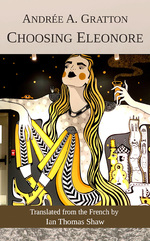Friendships are precious. They make us grow, they make us better. Friendships can also be as intense as romantic relationships, mirroring toxic behaviours and obsessive thoughts. Choosing Eleonore, Andrée A. Gratton’s first book, goes along this path through the eyes of the protagonist Marianne. Her obsessive behaviour towards Eleonore, a mysterious figure she only knows through excessive stalking, drives the narrative, filling this sixty-three-page novella with tension and pulling the reader along.
From the moment Marianne locks eyes on Eleonore, it is obvious that her obsessive behaviour is the symptom of something bigger. An unnamed mental condition might be the cause of this desire to absolutely become best friends with the elusive Eleonore, and Gratton dives into her character’s psyche without any limits or restraints, bringing the reader on a front-row adventure into the mind of Marianne, who seems to lack friendships of any kind. What seems, at first, to be an innocent desire to befriend someone she admires transforms into dangerous, destructive behaviour.

Choosing Eleonore
Andrée A. Gratton
Translated by Ian Thomas Shaw
Guernica Editions
$17.95
80pp
9781771836500
Throughout Marianne’s infatuation, we get a glance at the problem at hand: Eleonore is put on a pedestal; her personality and her traits are carefully crafted by Marianne, who makes her into something she wants her to be. She never takes the time to see Eleonore for the person she really is. When she finally is able to go to Eleonore’s place and meet her, Eleonore ignores her and orders her around. Marianne erases herself from the narrative, answering every need of her beautiful but unkind “best friend.” It is even easy to forget her name while reading the novella, as if she is anonymous in her fixation, putting even more emphasis on Eleonore’s goddess-like status.
This is the beauty of Choosing Eleonore. By forgetting Marianne, who erases herself completely throughout the story, we take her place. Her internal monologue becomes ours. We feel the tension between her and Eleonore. The story becomes a part of us and takes us to places we’d rather not explore. Because, while reading Choosing Eleonore, we cannot help but think about our own perception of friendship, the risks of being deceived when intense feelings are involved. We catch ourselves wishing for a resolution, for Eleonore to take action and say something to Marianne. As if noticing what is going on sends us back to our own flaws, our own obsessions, our own toxic traits.
This is a promising first novella for Andrée A. Gratton. Her writing is exquisite, direct, and above all, haunting. Her writing style reminds us of Vickie Gendreau. Her characters mirror the obsessive ones we used to find in Nelly Arcan’s novels. Choosing Eleonore is a must-read and a great first excursion into Gratton’s world.mRb






0 Comments